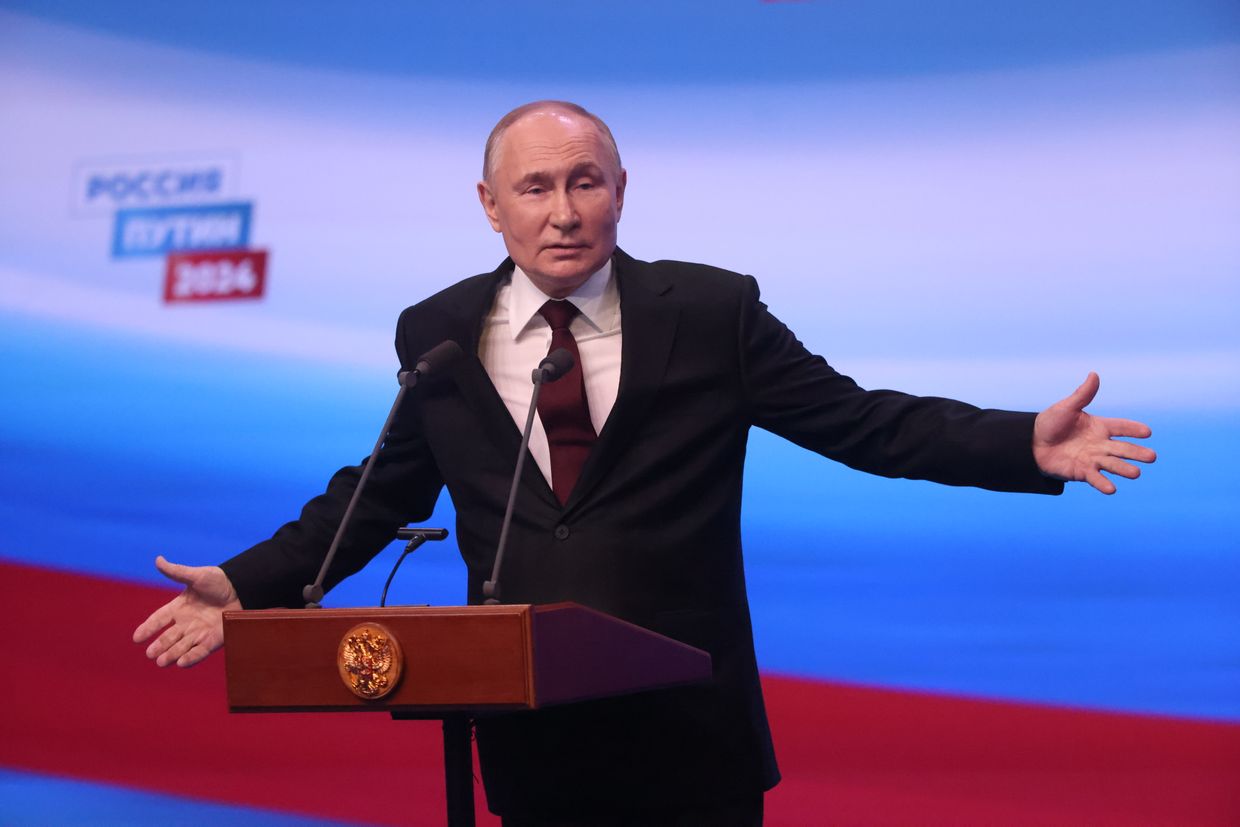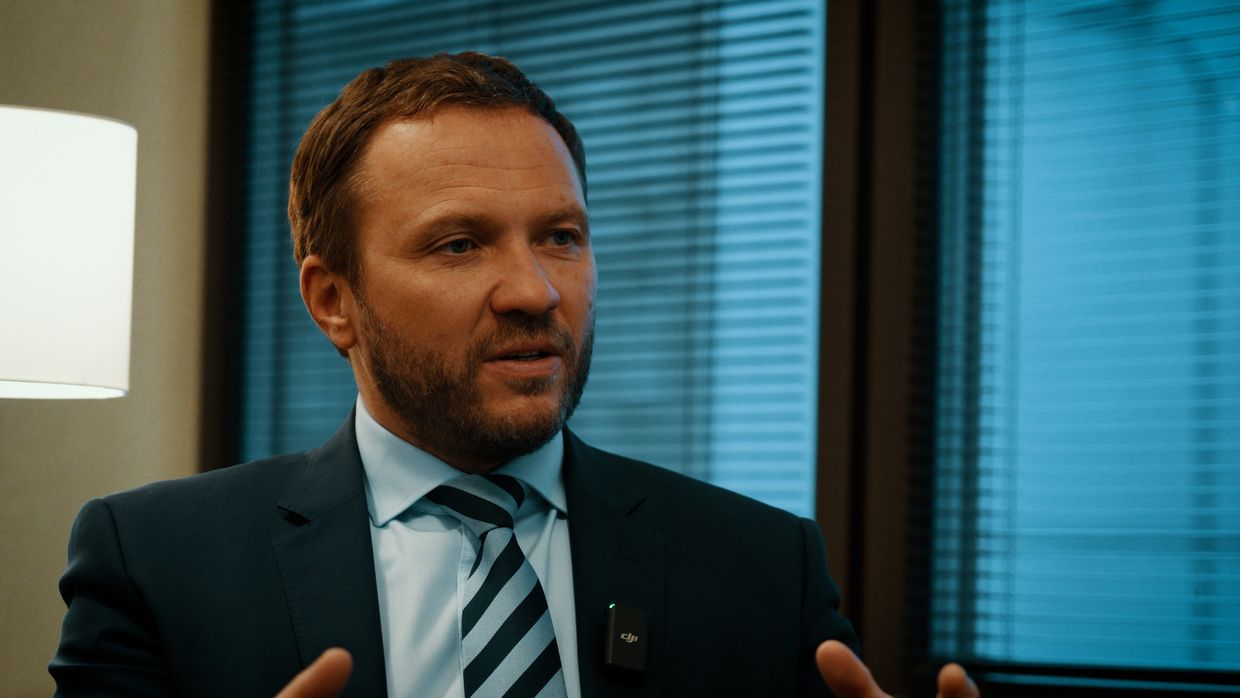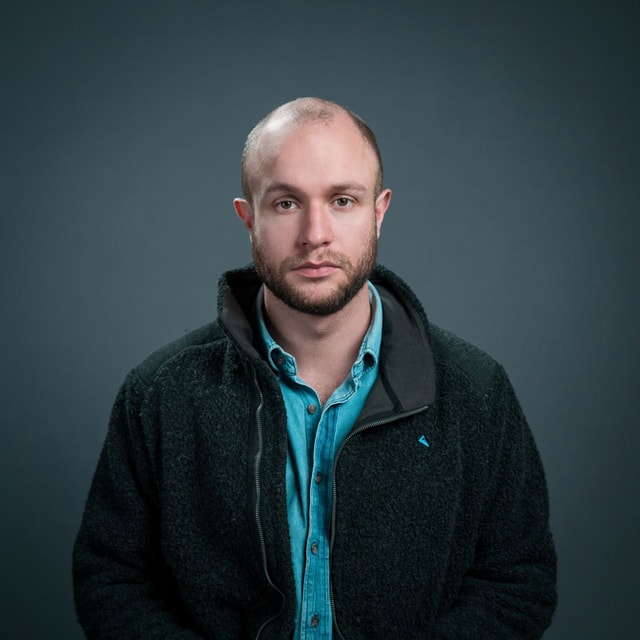Russia ‘delusional’ about its ability to sustain Ukraine war, says Latvian foreign minister

Latvia's Foreign Minister Baiba Braze speaks during a joint briefing with Ukraine's former Foreign Minister Dmytro Kuleba in Kyiv, Ukraine, on April 26, 2024. (Kyrylo Chubotin/Ukrinform/Future Publishing via Getty Images)
As Russia’s full-scale war against Ukraine nears its fourth year, a worsening battlefield situation and the election of Donald Trump to the U.S. presidency signal that the war could soon be entering a volatile and unpredictable endgame.
In anticipation of a potential Trump-negotiated ceasefire, Kyiv is looking to its partners to help put Ukraine in the best possible position, but it still remains unclear whether or not European countries will be ready to take braver steps.
With fresh memory of Russian occupation under the Soviet Union, the Baltic States have traditionally spoken with the most clarity on Russia’s war against Ukraine among NATO countries.
Consistently one of the top providers of military aid to Ukraine as a percentage of GDP, Latvia has entrenched the provision of at least 0.25% worth of its GDP to Ukraine in its state budget through 2026, and was also a founding member of the drone coalition.
The Kyiv Independent spoke to Latvian Foreign Minister Baiba Braze in Riga.
This conversation is part of a series of interviews with decision-makers in the Nordic and Baltic countries conducted during the European screening tour of the Kyiv Independent’s documentary film Can You Hear Me? The invisible battles of Ukrainian military medics.
Editor’s note: The transcript of this interview has been edited for length and clarity.
The Kyiv Independent: How have you watched this year from here, from Latvia, from just across the border with Russia, and how decisive could these next few months be?
Baiba Braze: It has been a year of decisions. It has been a year of our priorities, which were very clear: making sure that all the NATO countries on Russia's borders are safe and secure, and making sure that Ukraine is supported. For us, it's not about “for as long as it takes,” but actually looking at Ukraine's victory, which is to be defined by Ukraine, not by others. And, of course, limiting Russia's ability to gain military capabilities, constraining Russia politically and internationally.
"For us, it's not about “for as long as it takes,” but actually looking at Ukraine's victory, which is to be defined by Ukraine, not by others."
In all three priorities, we have done a lot and achieved quite a bit of progress. The allies' presence here in the Baltic states has strengthened. Sweden joined NATO, following Finland last year, so that also has meant a lot in terms of regional plans, defense plans. In terms of capabilities, we have provided what we could to Ukraine ourselves and we have really encouraged and worked with the others to do maximum. We have worked internationally to ensure that there is a lot of support for Ukraine. We have provided support for energy infrastructure.
As for Russia, obviously, it moved to the war economy much faster because it's an autocratic state. So they don't have to take into account what other countries think, what the population thinks, or what various interest groups think. They literally just throw thousands of people per day to death and there is very little accountability for that in Russia. Sanctions on our side have quite clearly meant that the Russian economy is really not doing well by all accounts. We can see that in data and analysis.
What they are doing is pillaging the civilian economy, taking out from the civilian side of the economy everything that they need for the military and then they are trying to avoid the sanctions that have been imposed not only by the EU but also America, U.K., and other countries in the world.
In Latvia, we created a system where it's very difficult to avoid sanctions. We are responsible not only for the exports of our capabilities but also for making sure that it doesn't go to third countries that could then re-export to Russia. Other countries in the EU have to do the same. All the exports have to be checked and there has to be a due diligence system for sanctions making sure that their exports don't reach countries in Central Asia and then go to Russia.
That has not yet happened. That is, I think, for the next year, a very important objective to make sure that all the EU countries, all European countries have a due diligence system on sanctions in place.
Plus, maintaining the pressure on the Russian economy, supplying Ukraine, and making sure that NATO is strong and united.

Working with the new U.S. administration is crucially important. But, on the battlefield, Ukraine is heroic. We speak to various institutions in Ukraine and I think it's crucially important to hold together and maintain this winter.
For Russia, it's just getting more difficult. That's why they're so desperately trying to take some villages now. And, from the Nordic-Baltic side, we will continue supplying what we can, what we have, and we will encourage others to do that. I think that nobody wants Ukraine to be left alone in terms of aid or support. There's solidarity, there's everything. So, just be strong and know that you have so many friends and allies.
That also concerns the wider future of Ukraine. You want to be in the EU and NATO. That is, of course, a guiding star for everything that Ukrainians do for the internal reforms, such as anti-corruption, and justice, which is as important. Because, in the end, Ukrainian people want peace, stability, security, prosperity, just like everybody else.
The Kyiv Independent: Since the U.S. elections, the topic of peace negotiations has come up more and more recently, and President Volodymyr Zelensky has said that Ukraine would be ready to end the fighting from their side without liberating all of its sovereign territory in exchange for NATO membership. Does Latvia share this opinion, is that the line that is taken in international discussions, or do you think there could be another alternative for a hard deterrence?
Baiba Braze: The future of Ukraine's membership in NATO is decided. There was a political decision, both in 2008 and at last year's Washington summit, that Ukraine's future in NATO is something that is not negotiable. But on the other hand, of course, with a war ongoing, what does it mean then to have security guarantees?
"Ukraine's future in NATO is something that is not negotiable."
What does it mean to be a member of NATO? Currently, NATO is not ready to enter the war, because the clear concept is that Ukraine's self-defense is supported, everybody supports it and provides what is necessary, but nobody wants to be part of the war, fighting the war. That's why there’s a question of the borders, which borders, if the ceasefire applies or if there is a sort of stop in hostilities, then the questions about security guarantees or Article 5.
None of these concepts are abstract, and I don't think people will be ready to discuss that much in public. I agree with President Zelensky that NATO membership is the best way for Ukraine, we support it, but I don't think it's an exchange for ceasefire or exchange for peace talks versus NATO membership.
The Kyiv Independent: Do you think it's possible in the near term to reach this unified understanding that peace must come with a secure Ukraine, or can it be solved afterward?
Baiba Braže: The understanding is there because nobody wants some ceasefire which just lets Russia reconstitute and then start more of the war. That's in nobody's interest. But the stronger Ukraine is on the battlefield, the stronger the position at the negotiation table. So that is a primary precondition of successful negotiations.
It will also be very difficult if there is some type of settlement because we know from our experience that getting Russian troops out is very difficult.
Nobody will recognize occupied territories as Russian. International law and Ukrainian international borders are what they are. It was the same with the Baltic states. We were occupied by the Soviets for 50 years, but neither the U.S. nor other Western countries recognized the occupation. We restored our independence, even though many people were saying, “Oh, that's not possible, that's not going to happen, how can you think of a full regaining of independence?”

Primarily, we as people – whether it's Latvians, Estonians or Lithuanians – know what we want. We make our choices, and Ukraine is the same. Ukraine knows what it wants, and it makes its choices. And yes, fighting for the freedom and for the future, which is the future of a free country, is very difficult, and the losses and the situation on the battlefield are very difficult, but it's worth fighting for, in my view.
The Kyiv Independent: Despite Russia’s problems, Moscow keeps saying that they are against a freezing of the conflict under any circumstances. Maybe they see some kind of victory in their sights. How do you interpret that?
Baiba Braze: I think it's, on one hand, delusional, ignoring the reality of the economy, of the real situation in Russia, and thinking that they can maintain this. On the other hand, it also shows their conviction that they have to take as much territory as soon as possible because that will make their position stronger. That's why we need to make sure that you are as strong as necessary, fighting for Ukraine's future, and showing the Russians that Ukrainians are not going to give up the fight. All those elements are as important, and of course, a very clear stance by the U.S. and by the Europeans and other powers in the world on saying that support for Ukraine will continue.
Everybody has said that. And that is a powerful message and stance to the Kremlin that you might think that by taking a few villages you are winning, but your economy and the situation within Russia are showing something different, and Ukraine will continue to be supported. But again, the will of the Ukrainian people is the first precondition.
It's crucially important to continue showing that there is a will to fight, to be free, to become members of the EU and NATO because nobody else is going to do that for you. Others will support it, but it's a Ukrainian fight.
The Kyiv Independent: When it comes to establishing a real hard deterrence against a repeat invasion, if it's not NATO membership itself, more and more people have been talking about so-called boots on the ground, a physical presence of troops from NATO countries or even non-NATO partners inside Ukraine. Do you think that physical presence is required?
Baiba Braze: I cannot discuss what is being discussed in classified conversations – it would be highly irresponsible of me. Latvia hasn't made any decisions because it's not a decision-making time. If there is at some moment the ceasefire or the settlement that Ukraine is satisfied with, that there is a very clear understanding of how to enforce it, together with allies, I would imagine Latvia is not going to say no.
But again, I don't have a mandate to say that currently because we are not there yet. So that would be highly irresponsible to sort of suggest something. But the sort of very strong message that we transmit to everyone and that we as Nordic-Baltic countries discuss and stand for is Ukraine first, that Ukraine's strength, Ukraine's supply is a battle.
The political support, the future in the EU and NATO is something that we are devoting all that we can to in terms of political support, money, and resources. But without Ukraine's leadership, without Ukraine's will, without Ukraine's standing for itself, nobody is going to replace that. So that is the first sort of leading light that we all look up to.













